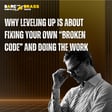Become a Creator today!Start creating today - Share your story with the world!
Start for free
00:00:00
00:00:01

Breaking Mental Health Stigmas with CISO Ben Howard: Suicide Prevention Month
September is Suicide Prevention Month. CISO Ben Howard joins the show to share his story for the first time. *Warning: This episode contains discussion of suicide and suicidal ideation.*
If you are feeling suicidal, call or text 988 to get help immediately.
George K and George A talk to Ben about:
🔍 The pressure CISOs face and how it impacts mental wellbeing
🧠 Breaking the stigma around mental health
🛠 Practical steps cybersecurity leaders can take to support their teams' mental health
✍ Creating a culture of openness and vulnerability
If you are struggling and feeling suicidal, call or text 988. Help is available, speak with someone today.
Transcript
Impact of Stress on Mental Health in Cybersecurity
00:00:00
Speaker
you know part of it is the stress of the job. And I think every every one of your listeners, um my fellow CISOs, they're all going to recognize how difficult our job is. know Our job, when we when we do it well, i nobody thinks we're doing anything. And well when we do it poorly, nobody thinks we're doing anything. ah So we we're always struggling for budget we're always struggling for recognition, we're struggling for appreciation, ah we're dealing with crisis after crisis, and it or it continues to affect my mental health, it affects the mental health of other security practitioners. And big part of the reason, you the the entire reason I'm here, is I have not told anybody about this. My family knows about this, a few of my close friends know about this,
00:00:51
Speaker
I have never told an employer about my struggles. I have never told an employer about how I could use more time away, how I might need a break. I have always tried to ah not quite put on a happy face, but grin and bear it. And that is that's something that yeah I want to change both of myself, but I see more importantly, if I'm going to i help my people, the the people on my team, if I'm going to help them deal with their own struggles, ah I have to be vulnerable. I have to be honest. I have to come out. I need to let people know that this is a is a real problem.
00:01:44
Speaker
I cannot address it ah transparently and sincerely without being honest that this is part of who I am. This is a a big part of who I was and it's going to be who I am for the rest of my life.
Introduction to Special Episode on Mental Health
00:02:04
Speaker
This is Bare Knuckles and Brass Tax, a cybersecurity podcast that tackles the human side of the industry. I'm George K with the vendor side. And I'm George A, a Chief Information Security Officer.
00:02:18
Speaker
And today we have a special episode. It's a difficult episode. We are talking with Ben Howard, a CISO, who has been very open with his struggles with mental health and a warning to our listeners before we get started. There is mention of suicide and suicidal ideation in this episode. If you are feeling like you are in a moment of crisis or you are thinking about suicide in the US and Canada, you can call 988 and get help right away. With that said, it's a tough topic, but September is Suicide Prevention Month.
00:03:01
Speaker
And mental health gets a lot of lip service in cybersecurity and we thought it was about time to tackle it head on. And Ben reached out and this is the first time he is sharing his story, but he thought it was important to start sharing it in order to get the stigma away from it. And we wanted to support him in that.
00:03:23
Speaker
Yeah, it's really important that Ben has his message heard far and wide within the industry, and this goes well beyond just our listenership or any other show.
Emotional Instability in Cybersecurity Industry
00:03:33
Speaker
I think anyone working in our field, be it working as a seller, be it working as a practitioner, as an executive, as a policy person, is and whatever it is,
00:03:43
Speaker
We have had to ride the wave of emotional inconsistency, instability in the labor force, with money going up and down every other day, and not knowing if we have futures, if we can put food on the table for ourselves and for our family. And you combine this with a lot of the life experiences folks in the industry often have from prior careers, be it in the military or anything else.
00:04:10
Speaker
um We are left to deal with a lot of baggage without much recourse and without much support. I think logically, like with most of the other problems we try to tackle in this show, the best support we have is each other. So we are going to try to take the lead. We are going to try to help bring Ben's message to as many people as we can.
Ben Howard's Mental Health Journey
00:04:32
Speaker
And we're hopeful that people choose to you know, at least you don't have to communicate to us, but in your own life, you at least choose to reach out to a friend, reach out to a loved one, or just find some support if you're not feeling the best and and it's not a normal, just bad day. Like if it's something deeper than that, we really plead with our listeners to to get help and we want to highlight someone like Ben because he's brave enough to to lead the way.
00:05:05
Speaker
Ben Howard, welcome to Bare Knuckles and Brass Techs. George, thank you for having me. I really appreciate the opportunity to speak with you. This is a special episode of sorts. We are here to discuss something quite different, but quite important. So ah we'll start by simply giving you space to tell your story and we will take it from there. I'm going to talk about how mental health and ah my journey of struggling with mental health. ah And yeah it started for me um in the late
00:05:43
Speaker
with the odds 2007-2008 and not actually related to work ah related to a number of personal matters that were going on. and I had ah lost hope and got to a point where um I attempted to take my own life. I was very fortunate in that somebody that I was living with at the time ah recognized What was going on? ah They called for help. They called 911. I got an ambulance. I got to the hospital. um And the doctor saved my life. um I would otherwise not be here had that person not acted quickly when they did. I i would have died in early 2008.
00:06:36
Speaker
We had spoken before this recording and part of the reason why both you wanted to share the story and we wanted to have you on is the topic is very salient and cyber, but I I think you also. Have other reasons for wanting to, I guess, come out with the story and and make it more publicly known. Yes.
00:07:02
Speaker
i So yeah i have since then, I have continued to struggle with my own mental health. I've continued to struggle with thoughts of self-harm. And I have, by all accounts, what is a wonderful life. I have a great family. I have healthy children. um I've got a ah great job, by all accounts. you know I'm well paid.
00:07:29
Speaker
and still, I'm struggling with this mental health aspect. And, you know, part of it is the stress of the job. And I think every every one of your listeners, my fellow CISOs, they're all going to recognize how difficult our job is. You know, our job when we when we do it well, nobody thinks we're doing anything. And when we do it poorly, nobody thinks we're doing anything. So we we're always struggling for budget we're always struggling for recognition, we're struggling for appreciation, ah we're dealing with crisis after crisis, and it it continues to affect my mental health. It affects the mental health of other security practitioners. And big part of the reason, you the the entire reason I'm here is I have not told anybody about this. My family knows about this. A few of my close friends know about this.
00:08:28
Speaker
I have never told an employer about my struggles. I have never told an employer about how I could use more time away, how I might need a break. and I have always tried to ah not quite put on a happy face, but grin and bear it. And that is that's something that yeah I want to change both of myself, but I see more importantly, if I'm going to i help my people, the the people on my team, if I'm going to help them deal with their own struggles, ah I have to be vulnerable. I have to be honest. I have to come out. I need to let people know that this is a is a real problem. I cannot address it.
00:09:22
Speaker
ah transparently transparently and sincerely without being honest, this is part of who I am. This is a a big part of who I was and it's going to be who I am for the rest of my life. So um i want to stop ah I want to stop hiding.
00:09:39
Speaker
um i want to I want to let everybody know that we many people have this issue. Many people struggle many people go well beyond burnout Many people think of self-harm. And if we can't talk about it, if we can't talk about it honestly, we can't help each other. And I want to i want to stop being part of ah what I'm going to call the problem, ah where we have the societal norm of you you just don't talk about mental health. It's something that other people experience. you know that that Yeah, I'm having a bad day, but we just grin and bear it. I want to stop being part of that problem.
00:10:21
Speaker
i want to start being part of the solution of helping people to ah come to terms with what they're dealing with, help them give them the space to to make progress, to move forward.
Hosts' Personal Experiences
00:10:36
Speaker
um And that's what this is really all about.
00:10:40
Speaker
Yeah, I I really appreciate you coming forward with that. And I do think transparency is key. It wasn't until you and I had this conversation that I also started talking more publicly about having had suicidal ideation three different times in my life. um Again, that was close family new, but I didn't talk about it, certainly not on a microphone.
00:11:06
Speaker
Um, but yeah, I just want to say thank you and, um, well well yeah, been little bit more I gotta to be honest with you, man. Um, that was, um, what you're doing is incredibly brave and courageous. Um, I went through, without when I was in army and I left in 2016, I went through about three years of pretty, uh, pretty intense and regular therapy to kind of plug back into the normal world. Um,
00:11:31
Speaker
And I've talked to a couple of employers about it, like once it really, really came down, I started to go up the ranks. I'm fortunate. In Canada, we have a little bit of a healthier environment because a lot of folks after Afghanistan, they were, we had problems. We had guys coming home, doing a lot of bad things themselves, a lot of bad things to their families. A lot of people ended up homeless. This is still a problem to this day.
00:11:54
Speaker
um I really appreciate you doing this and and bringing this message out. I think a lot of people, there's there's a lot of, I'll speak to the community that I know as the ex-military community. There's a lot of people in our industry that are ex-military and you know just because you have a nice new job, does it doesn't mean the baggage goes away or the problems go away. So um really and truly thank you. And this is going to mean a lot to a lot of people, man. What you're doing is incredible. this is um I never expected we'd be doing this when George and I started the show, but i think this might be one of the most important episodes and issues that we were probably ever going to do. So so thank you for being the catalyst for that.
Mental Health Management Strategies
00:12:38
Speaker
Yeah. And I think, Ben, you point out a dynamic here. there's There's two things. There's removing the stigma by way being open and talking about it and saying self-harm and suicide and not talking in euphemisms.
00:12:52
Speaker
And there is also the acknowledgement that it is something to manage. I may not have suicidal ideation and you know for the last decade plus, but I do have depressive tendencies and a large part of my life is learning to recognize those or see them and like begin to you know put in the coping strategies.
00:13:16
Speaker
Um, so I guess I want to, I don't really know what question to ask, but I, I think it's maybe giving you more space to talk about that management piece. Like the, okay you know, it's, it's not something that like you fix quote unquote, and then like one day it's done. Right. Right. That's absolutely right. Uh, this is, this is not, I don't think this is something to be fixed. This is a part of who I am and.
00:13:46
Speaker
i Yeah, i I absolutely don't like that I get to the point where I i want to commit suicide. I don't i don't like that, but i you know the depressive episodes as you as you brought up, i I go through these where you know it's like the wrong music, wrong watching the wrong story, reading the wrong thing, and i'm and it it can trigger something.
00:14:13
Speaker
and
00:14:15
Speaker
and And that's not, I don't think that's something that's broken. And I don't think that's something to be fixed. I think something to manage, as you said, it's something to recognize oh what causes this, what, what pulls it out, ah what brings it out of you. And, and it's something to develop strategies for how can you, how can you feel, how can you deeply feel and go through this and come out on the other side? And I think that,
00:14:45
Speaker
You know, this is something that I, it took me a long time to start recognizing, uh, for example, that certain music that I listened to does this. And I, I now have, I now have quarantined that music off. I actually still still have it. And I have a, I have a depressing playlist and I, and, and sometimes I want to listen to it and I want to just, you know, I want to feel, I want to feel the pain, but I, I, it has an end.
00:15:14
Speaker
And I'm able to do it in a safe place where I can then come out on the other end. And I i recognize what i'm what I'm getting into when I started. But ah it's it's otherwise quarantined. It's it's in it's in the its own little boulder that yeah it's I know what I'm getting into when I when i go to that. But beyond that, it's ah for me, it's recognizing situations. it's recognizing as i said you know the movies the music, etc. ah And it's preparing myself. So i I manage it by if I know interactions with a certain person or a certain type of person are going to result in
00:15:59
Speaker
it just rumination. And i this is something that I know a lot of people struggle with. I certainly do, where I get in my own head and I go through that conversation over and over and over until I think I'm a terrible person, until I think I did everything wrong. And you it under my skin. And it it really, ah that itself can can trigger a depressive episode.
00:16:29
Speaker
Yeah, I say the, but I try to prepare for those and managing it. If I know this interaction is going to happen, if I know that it's something I can't avoid or something I need to do, I prepare for it ahead of time. I i go in knowing, all right, when this happens, when this is said, this is how I'm going to respond.
00:16:48
Speaker
And I try to be prepared. That's a big message for me to manage. And then that's proactive management. There's still reactive management. So how do you get out of it when you and you've already i started? And George, you and I, we talked and and you were telling me about ah something that ah you were doing with some some of your colleagues about thinking about their toes. um Feel your toes. yeah And you feel your toes.
00:17:19
Speaker
And I ah that really resonated with me. And while i I don't think about feeling my toes, I think about.
00:17:32
Speaker
Might have to hold on just a second, I apologize. Yeah, no, take your time.
00:17:38
Speaker
um
00:17:47
Speaker
Yeah, I will. oh let me Let me get my thoughts straight. I apologize. Oh, no problem. This is this heavy subject matter. I get it.
00:18:03
Speaker
And we can, we can skip this segment entirely if you would like, if it's easier. No, I i think it's important. It's just, I don't know that I have, you know, the reality is I don't know. I don't have the answers. Um, I am still struggling with this myself. And if I knew that there was something that always worked, yeah, man, I'd have something to bottle and sell. Um, but the reality is this, there's nothing that always works. Um, yeah. And sometimes it's, it's simple, ah you know, count backwards from, all right, this one's going to sound ridiculous, but count backwards from 100 using only prime numbers. It was something from a and TV show, a sci-fi show in the 90s. And I don't know, it always stuck with me. So count backwards from 100 using only prime numbers. And you're like, you can't
00:18:54
Speaker
Can't really think about anything else when you're doing that. Yes. That is the, ah essentially, I think you, you discussed rumination, which is a, you know, and a known psychological phenomenon and whether it's like the toes exercise walking. I mean, a lot of the exercises are designed to break that loop.
00:19:14
Speaker
right break Break it in some way, either like make the mind go somewhere else um or you know make it so physically exerting that the mind has to go into a different mode entirely. I think there's ah there's something to be said about differentiation of your feelings. right like I remember when I was going through a lot of my therapy, it was, you're not your feelings, you're not that moment. like I go through a visualization exercise where I imagine that my my bad feelings are a ball.
00:19:44
Speaker
And I don't want to feel them right now. So I'm going to put the ball away, like visualizing it by head, a shelf. I'm going to put the ball on the shelf. It's still there. I don't have to deal with it eventually, but I don't want to deal with it right now, per se. So at least it'll give you a chance to kind of process. I wanted to ask you, though, because you you brought up a really good point earlier in that. It's the loss of hope.
00:20:05
Speaker
Right. Maybe you could help some of the listeners understand when you lost your hope. I always, I always was told, you know, when you lose hope, that's kind of the last straw before something bad potentially happens. How did you get that hope back or how did you fight out of that hole? Because maybe that's that could be something tangible that people are just looking for that lifeline, you know.
Hope, Responsibility, and Family Commitment
00:20:28
Speaker
ah So and this was um almost 20 years ago now what 14 2008 16 years ago you know I can tell you that some of it I don't remember um some of it was I when I when I woke up um
00:20:55
Speaker
in the hospital, I don't know, it was several days had passed from when I attempted suicide to when I woke up and I was then I was immediately shuffled off to to a psychiatric court. And it was yeah ah not voluntary, but the not involuntary. they They give you the option of you can sign this paperwork saying that it'll be voluntary, or we can just keep you here against your will. And so I i signed the paperwork and and I stayed in a psychiatric ward for around seven or eight days for observation. And this was the the next big thing that struck me is, and this was I think the start. So
00:21:44
Speaker
of how I got out. and it was ah The psychiatric ward was terrible. ah you know it was just It seemed to just be cots that they were counting people in cots. And you know as soon as they ran out of cots, it was very much, all right, you're out. There was at no point did I ever tell a a doctor ah in the psychiatric ward that I felt fine and I'm i'm okay. At no point did that ever happen.
00:22:14
Speaker
and they still just put me out. um yeah And it struck me as this is this is the the healthcare system that we have around mental health is that you're you're really you know you're you're really just being pushed through the system as quickly as possible and not actually getting help. ah At the time, it felt like I don't ever want to be here again. And so I'm going to like pretend this didn't happen. I'm just going to go about my life and I'm going to move on. And it is has since impacted me in a number of negative ways that I can't get life insurance.
00:22:56
Speaker
um i'm a guess that will become obvious. you know Nobody wants to insure you if you you might take your own life, but I can't get life insurance. I have three little kids and I can't get life insurance so that if something were to happen to me, like they're and they're not protected. and And so that in and of itself,
00:23:16
Speaker
it nothing is nothing is any one way. it it's It does two things. One, it makes me depressed. it it makes that's where it makes it worse. yeah But it also makes me want to do better. It also makes me want to be as healthy as I can be. Because I don't have any other choice. If if i if they're not going to be taken care of, if something happens, i I've got to continue to... i I've got to stay alive. I've got i've got them i have people who depend on me. um But again, that and also is in and of itself a
00:23:55
Speaker
Uh, a struggle, something that like I, you know, this is not to say that family is a burden, but it is that I have, I have a responsibility that I cannot, that I can't not do. And, and that, that itself, that there's, there's weight to it. Uh, so I don't know. I don't know if I have the right answer of how do you really start to climb back out? Um, yeah.
00:24:25
Speaker
Because I don't, I don't know that I've ever climbed down. Um, you know, I think one thing that i've I've promised to my wife was, um, if I ever get to the point where I've completely lost hope again, we will, before I do anything that I can't come back from, we will.
00:24:50
Speaker
sell everything, we'll leave everything, we'll abandon everything if that's what we have to do, and we just go somewhere else. We will walk out of whatever is going on, because what am I doing otherwise if I if i hurt myself? And this is just, i'm very I'm thinking about it very logically, and I know people don't think about it logically. I didn't think about it logically when I when i did it, but you know the idea is I can always i can always hurt myself tomorrow.
00:25:18
Speaker
So let's at least try getting out of the situation first. Yes. I think though in your answer is something, which is you're having an open dialogue.
Creating Supportive Environments in Security
00:25:30
Speaker
It's, it's again, it's not being shunted back into the closet as a thing to be hidden from view or there's a stigma. I mean, you just have to deal with it openly. Right. Right.
00:25:42
Speaker
um
00:26:10
Speaker
So Ben, thank you again for sharing your story with us. What would you like your fellow security leaders to take from this? Recognizing that everyone has different levels of stress and circumstance, but you're making this act of ah coming out with it. And um I just want to give you the room to talk about what you hope others can take from it.
00:26:36
Speaker
Yeah, thank you. yeah I think there's the number one thing I want others to take away is that don't don't keep this to yourself. Don't bottle it up. Don't hide it. That will only make it fester. It will only get worse. You will not get help if you keep it contained.
00:26:53
Speaker
If you are having ah mental health problems of any sort, please please talk to somebody. I know at the beginning I provided the 988 number. ah Look, it it doesn't have to be. don't Don't let it get that far. If you can talk about it now, you can deal with it. You can develop strategies that work for you.
00:27:16
Speaker
The key is you have to talk about it now. um and And so that that's my hope. That's my takeaway is that, like, I, I, I made the mistake of, you know, just, so I don't know. I didn't talk to anybody ah and it went way too far. I actually tried to take my life. And my hope is that you don't have that problem, that you are able to talk to somebody.
00:27:46
Speaker
and that you were able to get the help you need before it ever gets that far. Yeah, man. Now you've done a better job of me at this episode, Ben. i'm ah Yeah, you know you're doing really good. I need to tell you, I need to tell you that you're doing a great job talking about this and advocating for it before um I go into the question. Just please, please know that you're doing a great thing and you're doing a good job.
00:28:13
Speaker
um So I want to talk about from CSO to CSO, dealing with the culture of good C-suites, good boards that you sit on, and good boards of shareholders and directors that you have to deal with, and bad ones. Because I know that in our line of work, in our position,
00:28:34
Speaker
The difference between a good mental health time and a bad mental health time is when your peers at your level and when the the folks who control the first strengths, they're at least good natured and willing to listen to you. But a lot of folks in our seat don't don't have that luxury. you know So ah you know how do you and your experience How do you deal with effectively both the good times and the bad times? And maybe some advice on you know kind of ways to to stay in a good place, even if you're not in the most ideal business environment. Well, I think I want to start with the the an unsupportive board, an unsupportive executive team. I don't think that is sustainable long-term.
00:29:26
Speaker
and and i want to let's put mental health aside for a moment. I don't think that's sustainable long-term if you're going to be a successful CISO. If you do not have a supportive board, if you do not have a supportive executive team, if you don't get all the budget you need, nobody ever gets all the budget they need. ah that That's a fact of business. But if they are going out of their way to strip away your budget, to strip away the tools, the personnel that you have, they are not listening to the risks that you're presenting. You need to find an exit plan. You cannot continue to stay there. ah That will become, you you will be the scapegoat when that company gets attacked, when they when there's a compromise. So this is something you you have to start looking somewhere else.
Dealing with Unsupportive Leadership
00:30:20
Speaker
ah Now, that's not to say that you need to find a place where ah you know it's all ah that everything is good, everything is perfect, you get everything you ever asked for. That doesn't exist. ah I think a supportive board and a supportive executive team is one that listens to you. ah They may not understand but they're willing to give you the space to try to explain it. um They are ah may not give you all the budget that you need, but they have a theyre they understand that there's risk and they understand what risk ah because you're communicating it. They understand what risk they are accepting, even if it's only for the short term or whether it's permanent. They understand what risk that poses to the organization. So you know my job as as a CSO is to present this risk
00:31:13
Speaker
and to make sure that they understand and can make a business decision about whether they spend their dollars on some other project or my cybersecurity team. I agree with that. that's um I think you kind of hit the point there though. it's um in this job and I felt it before, I know the feeling. You can be set up to be a Patsy. You can get recruited with all the nice language, all the nice dinner, all the nice things. But at the end of the day, no budget, no operation, all the risk. That's something that you lose sleep and probably cry a few times over because
00:31:54
Speaker
That's a no one situation. I think that's every CSOS nightmare. And when George started mine over cyber, like that was very specifically from ah from a security executive standpoint, that's the situation, the nightmare that that some of us face. And I think it's good to call it out. And I thank you for actually, you know, saying the right thing. If you find yourself in that situation, get out, because there is no winning. Then how have you
00:32:23
Speaker
used this experience to lead your team or to cultivate.
Practical Steps for Supporting Team Mental Health
00:32:32
Speaker
Uh, a culture on the team where people feel comfortable. i I think this is like one of the biggest concerns for me is that if the pervasive grin and Barrett culture, you know, starts at leaders, it it also starts all the way down, right? Analysts burning many more hours than they need to, because there's a pressure.
00:32:56
Speaker
I, you and I have talked a little bit, but what are some like practical things you've done to to cultivate that on your team? ah Some of the the practical things include if you need time away, if you need to get up from your desk, you need to walk away.
00:33:11
Speaker
No questions asked. ah There is a very clear, ah something that I communicate to everybody on my team, and this is everywhere I go, something that ah one of the first conversations we we have when somebody ah comes on and starts, or if I'm new and I'm and i'm talking to them, is you, your health, and your family come before the job.
00:33:35
Speaker
We are all here to earn money so that we can support our families. Look, I fully support the mission of the company as well. I'm here. I'm at my company because I care about that mission. But my personal health has to come first. My family has to come maybe also first. But those have to come before for the business. And so I'm very clear with my my people that if you need time this is no questions asked You don't need to explain. ah We're adults. ah As long as you're not just trying to take advantage of the situation. like I understand people people have... you you You can have...
00:34:20
Speaker
You can have family emergencies, you can have kid emergencies, you can have mental health emergencies, and those can come in the snap of a finger. You might need to just go. And I don't need you to to feel like you have owe me an explanation. I don't want you to feel like ah you have to divulge anything you're not prepared or interested in divulging. ah Frankly, from my perspective, it's personal health information. I don't want to know it.
00:34:47
Speaker
ah so I don't want you to feel like you are coming to work and needing to choose between work and your family or choose between work and your your personal health.
00:35:01
Speaker
Yeah, so ah for my new employees, anybody anytime somebody comes on, ah one of the things that I do, you know we have unlimited PTO, which is a great benefit that ah many people don't take advantage of, including myself. ah have And it's not to say that we can be off all the time, but it means that ah we have the ability to be off a little bit more than ah than what we do in practice.
00:35:26
Speaker
And so i ah I ask all of my new hires, anytime somebody comes on, i this is your first, particularly when your calendar is still not fully booked. I ask everybody to consider taking a mental health day, just going ahead and booking out a mental health day one day a month in perpetuity. If you need the last Friday of the month, if you want the first Monday of the month, ah you know i I want people to to know that they have my support to be able to take the time that they need and that I support them taking time off. I certainly need people at work. I certainly need what they're providing me, i but I also need them to be fresh. I need them to um ah be able to focus while they're here. um And again, I need them to know that i support them but and I support them as a person, not just them as somebody who works for me.
00:36:24
Speaker
Yeah, that strikes me as one of those things that might feel like a 1% gain that has an outsized effect because one, as you said, it demonstrates and communicates what you think about your direct reports, but also the reality of security operations, which is,
00:36:50
Speaker
being too tired to operate is like, it's the reason why first responders and pilots have very strict rules around how much they can operate without sleep.
Final Call to Action for Mental Health Support
00:37:01
Speaker
It's not going to do anyone any good if they are physically present and mentally out. right Yeah, it's, uh, it's quite correct. And it's actually a good, um, good lead into my question. Um,
00:37:16
Speaker
for your people, what are your recommendations around really analyst burnout? Because um I remember when I was an analyst, especially when I was working shift work, I was at the in the MSSP when I first started. My shift cycle is exhausting. It takes years off your life, especially when you're working overnights and eaves and you're you're transitioning like every couple of days in the string.
00:37:37
Speaker
um And a lot of folks too, you know, you end up in some organizations where you have unrealistic expectations. um I won't say which employers or whatever, but you have some organizations that will sell, especially if it's the MSP, they'll sell the engagement contract.
00:37:54
Speaker
And then within that contract, they bake in FGE. So they're supposed to buy one to two roles for that new client. But the reality is they actually cut that money up, put it back in the profit that goes to the directors and to the shareholders.
00:38:09
Speaker
um But your team, which doesn't grow, just gets more work piled onto it. um And that happens you know in a repeated cycle, like five, six, 10 clients. um Your team really starts to burn out and you get alert fatigue. um You start missing alerts. start You start getting guys who don't really want to come to work. You start start getting guys who just don't want to deal with the nonsense.
00:38:35
Speaker
um So obviously outside of bad business practice, that's still a bad business practice. How do you deal with the standard analyst burnout when you have all this complexity of all these devices and you're constantly have to learn new technology and really you just want to stop bad guys from hitting your client? I yeah i i don't know if I'm going to have a great answer for how do I deal with analyst burnout and that I don't have enough analysts. I don't think that are this is something that has come up on a regular basis.
00:39:08
Speaker
I think one of one of my strategies is being proactive to prevent it in the first place. ah so we are yeah I actually worked for a number of NSPs, and from that, one of my key takeaways was ah that I need to treat ah my all of my personnel in a billable hour perspective. and What I mean by that is,
00:39:33
Speaker
What would it take if if i if I have you know a tool that needs to be monitored 12 hours in a day? ah What would it take to to have that done on a by a billable consultant? It would take 12 billable hours. so i need to then have somebody ah coverage for If I need coverage for 12 hours, I need 1.5 FTEs. I don't need one person working 12 hours. I need 12 12 person hours. And so i I push for any new project, any new tool, any new service, ah any any work ah that is expected. I push for eight hour days for my ah personnel. I don't push for, no, we'll just get it done. No, we push for acting as if we were an MSP i and and that i am I am essentially selling the company billable hours.
00:40:32
Speaker
So that is, it's a way that I'm trying to prevent the, uh, the burnout from happening in the first place. You know, alert fatigue, uh, it's another great point and we actively, actively tuned alerts. Uh, and it doesn't matter how trivial it is. I don't want to get an informational alert if all we ever do is delete it. Uh, we, we need to, anything that does not probably provide value has to go.
00:41:02
Speaker
Yeah, absolutely. Thank you. All right. Well, Ben. Again, thank you very much for taking the time to share your story. And I know it, it took a lot out of you and a lot out of all of us, but I reiterate, it isn't very important. It's a critical conversation to start and to continue to have. So thank you again, George and George. Uh, thank you for having me. I really appreciate the opportunity to speak about this and I want to, uh, as a parting thought, again, remind
00:41:38
Speaker
ah the listening audience here. If you're having imminent thoughts of of suicide or self-harm, please get help right now. Stop listening. Call 988. If you're not having imminent thoughts, start talking. ah You have to have to open up. You need to be be able to share at least with those closest to you. and that that will It will save your life.
00:42:08
Speaker
If you liked what you heard, be sure to share it with friends and subscribe. New episodes of Bare Knuckles and Brass Tax drop every Monday. If you're already subscribed, thank you for your support and your swagger. We'll catch you next week, but until then, stay real.



















